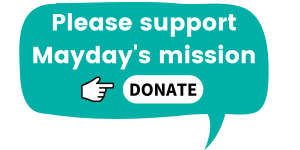Ok…Yeah…Great!
Ciara Killeen, Executive Assistant and Quality Assurance Manager, looks at the importance of being okay with being uncomfortable when prototyping.
I have worked at Mayday Trust for five and a half years and during this time my colleagues have come to understand two things about the way I work:
- I will always try everything at least once as I see the value in saying yes. I get stuck in with prototyping something, seeing the result and trying again. You learn through the experience of doing; sometimes what you learn is that something doesn’t work – but at least you know that now!
- When I say, ‘Ok…yeah…great’ in response to a request, no matter how cheerily I say, it means that things are definitely not ok or great. It can mean I feel uncomfortable with the concept. It can mean this is going to be a lot of work on top of the lot of work I already had. But I say yes anyway.
I do not say yes to be a people pleaser. My role as Quality Assurance Manager and working with Innovation Partners to develop the framework of the Personal Transitions Service, is often anything but people pleasing. When I think I have done a fabulous job of developing a policy or template which really captures frontline feedback, and then everyone hates it, I am definitely not pleasing anyone. Or when I make teams go back and re-review a process or trial a form again, for the 5th time, in order to probably create version 6, no one is particularly fond of me. But my colleagues and partners also say yes.
So, the question is, why do we all say yes? Why do we agree to work together to prototype something new when it would easier to say no? When maintaining the status quo would save us all time, effort and, honestly, save face sometimes. Sticking your head above the parapet to offer something new means your work will be subject to scrutiny and when prototyping things can and will go wrong. We all work together as a partnership to prototype because it is the right thing to do for people  experiencing tough times, who should have access to personalised, transitional and strength-based approaches. These approaches should be led by the real-world feedback from those we work with and the experience of frontline teams who see the systemic barriers that need to be removed. Prototyping starts from this feedback, not from a preconceived idea of what we should do. And what’s more, we know from experience that prototyping works, even if it’s a lot more ‘yeah’ and not so much ‘great’ to begin with.
experiencing tough times, who should have access to personalised, transitional and strength-based approaches. These approaches should be led by the real-world feedback from those we work with and the experience of frontline teams who see the systemic barriers that need to be removed. Prototyping starts from this feedback, not from a preconceived idea of what we should do. And what’s more, we know from experience that prototyping works, even if it’s a lot more ‘yeah’ and not so much ‘great’ to begin with.
The Personal Transitions Service (and Innovation Partnership) started, grew and developed from prototyping. Wisdom from the Street told us the two main problems people experienced when they entered services;
- Current systems and processes are dehumanising, humiliating and can end up institutionalising people.
- This way of working is not effective. The outcomes are not good enough. Too few people move out of the system and sustain positive life changes.
Once we heard this and saw the systemic barriers trapping people we had no choice. We had to start prototyping. It began with accepting that we were not separate from these issues but part of the system creating them. That definitely was an, ‘Ok…yeah…great’ moment for all of us. No one likes to believe they are causing the people they want to help harm. But the numbers of forms we asked people to fill in, with the level of personal sensitive information we requested, just so they could access support was doing just that. Tweaking parts of the broken system was never going to make change happen; we needed to prototype and develop something completely different.
So the first question I was asked was could we reduce the number of forms? Then could I incorporate the feedback from frontline teams who had used the new forms? Then could I attend a meeting to hear more feedback….reduce the number of forms again….think of a new layout….change the language….remove this section….get rid of these questions….look at this form again….now the policy that goes with it……
In the beginning it was relentless. Every week I was asked to consider something new, listen to more feedback, review our language and update the form or policy or process again. The updated version was tried, feedback sought, updates made and we continued on the merry-go-round. It took 18 months to complete the first DRAFT (not the final version, like painting the great bridge, it’s never truly finished if it is led by the grassroots) of the Personal Transitions Service Framework and people got very used to me saying, ‘Ok…yeah…great’. My colleague printed the words onto a poster and hung it by my desk.
But slowly there was a move from being just ‘ok’ to ‘yeah…I am starting to see where we are going with this’. Then one day I reached the Holy Grail. I received an email from an Asset Manager saying the new document is great. It works for people (it has since been updated, of course, but that’s prototyping!).
Prototyping is, let’s face it, a lot of continuous, sometimes hard, work. It can be frustrating. It can mean you are left for spells when there is no framework at all to guide you because you haven’t developed it yet. That is a sink or swim moment and you get used to muddling through as you listen to feedback, you learn, you adapt and you eventually do what you are there to do; provide something that actually works for people.
And prototyping can be exciting, refreshing and engaging too – bringing everyone together as one  team in the quest to turn feedback loops and frontline influence into a meaningful framework. Nothing builds team spirit more than a good old debate lasting 30 minutes about whether we need someone’s contact number AND email address on the referral form (just in case you’re wondering, we just added a blank contact details box and people can decide what information to share. Feedback tells us it’s working really well).
team in the quest to turn feedback loops and frontline influence into a meaningful framework. Nothing builds team spirit more than a good old debate lasting 30 minutes about whether we need someone’s contact number AND email address on the referral form (just in case you’re wondering, we just added a blank contact details box and people can decide what information to share. Feedback tells us it’s working really well).
So the next time you hear me say, ‘Ok…yeah…great’ then be assured that I actually believe it will be great in the end and that I am in it for the long prototyping haul with you.

